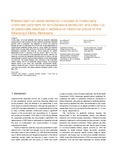Pressurized hot water extraction coupled to molecularly imprinted polymers for simultaneous extraction and clean-up of pesticides residues in edible and medicinal plants of the Okavango Delta, Botswana

View/
Date
2013-10-08Author
Mokgadi, Janes
Batlokwa, Shima
Mosepele, Keta
Obuseng, Veronica
Torto, Nelson
Publisher
De Gruyter, http://www.degruyter.com/Rights
This work is licensed under the Creative Commons Attribution-NonCommercial-NoDerivs license,(http://creativecommons.org/licenses/by-nc-nd/3.0/), which means that the text may be used for non-commercial purposes, provided credit is given to the author.Type
Published ArticleMetadata
Show full item recordAbstract
In this study, an in-cell extraction and clean-up approach, employing pressurized hot water extraction (PHWE) coupled to a molecularly imprinted polymer (MIP) is proposed. The selectivity of PHWE was improved through the use of a chlorophyll MIP (PHWE-MIP) for the determination of organochlorine pesticides residue levels in various edible and medicinal plants of the Okavango Delta, Botswana. The PHWE-MIP method achieved simultaneous extraction and clean-up. PHWE employed an optimal
temperature of 260 °C, pressure of 90 bar and flow rate of 1 mL min-1 in 10 min for the extraction of the pesticides from plants while the MIP selectively overcame the interfering chlorophyll prior to analysis with gas chromatograph coupled to electron capture detector or mass spectrometer
(GC-ECD/MS). The results obtained were compared to the QuEChERS Official Method 2007:01 for pesticides residue analysis. The proposed method seems to be nearly fully automated, environmental friendly, selective, simple and quick. Moreover, the recoveries of planar pesticides were improved (93-95%) with relative standard deviations (%RSD) of less than 10%.
Collections
- Research articles (ORI) [270]
